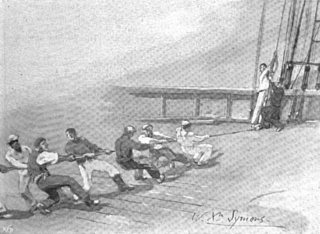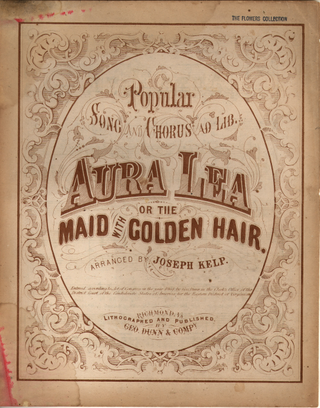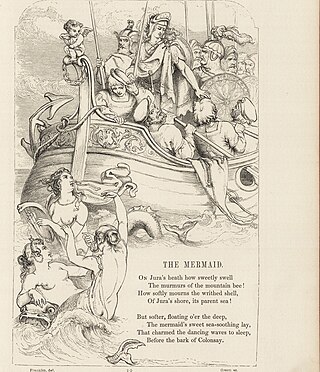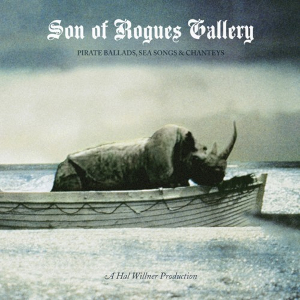
A sea shanty, chantey, or chanty is a genre of traditional folk song that was once commonly sung as a work song to accompany rhythmical labor aboard large merchant sailing vessels. The term shanty most accurately refers to a specific style of work song belonging to this historical repertoire. However, in recent, popular usage, the scope of its definition is sometimes expanded to admit a wider range of repertoire and characteristics, or to refer to a "maritime work song" in general.

"Aura Lea" is an American Civil War song about a maiden. It was written by W. W. Fosdick (lyrics) and George R. Poulton (music). The melody was used in Elvis Presley's 1956 hit song "Love Me Tender".
"Oh Shenandoah" is a traditional folk song, sung in the Americas, of uncertain origin, dating to the early 19th century.

The Mermaid is a ballad, catalogued as Child Ballad #289, Roud 124. Dating to around the mid-18th century, this song is known by a number of names, including Waves on the Sea, The Stormy Winds and The Wrecked Ship.
"Midnight Special" is a traditional folk song thought to have originated among prisoners in the American South. The song refers to the passenger train Midnight Special and its "ever-loving light."

"The Twa Sisters" is a traditional murder ballad, dating at least as far back as the mid 17th century. The song recounts the tale of a girl drowned by her jealous sister. At least 21 English variants exist under several names, including "Minnorie" or "Binnorie", "The Cruel Sister", "The Wind and Rain", "Dreadful Wind and Rain", "Two Sisters", "The Bonny Swans" and the "Bonnie Bows of London". The ballad was collected by renowned folklorist Francis J. Child as Child Ballad 10 and is also listed in the Roud Folk Song Index. Whilst the song is thought to originate somewhere around England or Scotland, extremely similar songs have been found throughout Europe, particularly in Scandinavia.
"The Maid Freed from the Gallows" is one of many titles of a centuries-old folk song about a condemned maiden pleading for someone to buy her freedom from the executioner. Other variants and/or titles include "The Gallows Pole", "The Gallis Pole", "Hangman", "The Prickle-Holly Bush", "The Golden Ball", and "Hold Up Your Hand, Old Joshua She Cried." In the collection of ballads compiled by Francis James Child in the late 19th century, it is indexed as Child Ballad number 95; 11 variants, some fragmentary, are indexed as 95A to 95K. The Roud Folk Song Index identifies it as number 144.

"The Great Silkie of Sule Skerry" or "The Grey Selkie of Sule Skerry" is a traditional folk song from Orkney and Shetland. Sule skerry being a far flung island of the Orkney archipelago. A woman has her child taken away by its father, the great selkie of Sule Skerry which can transform from a seal into a human. The woman is fated to marry a gunner who will harpoon the selkie and their son.
"Young Beichan", also known as "Lord Bateman", "Lord Bakeman", "Lord Baker", "Young Bicham" and "Young Bekie", is a traditional folk ballad categorised as Child ballad 53 and Roud 40. The earliest versions date from the late 18th century, but it is probably older, with clear parallels in ballads and folktales across Europe. The song was popular as a broadside ballad in the nineteenth century, and survived well into the twentieth century in the oral tradition in rural areas of most English speaking parts of the world, particularly in England, Scotland and Appalachia.
"The False Knight Upon the Road" is a British ballad, collected and published as Child ballad 3, Roud 20. It features a riddling exchange between a schoolboy and a "false knight", the devil in disguise. As to its provenance, it is presumed to not be much older than its first publication in 1824.
"Bonnie Annie" is a folk ballad recorded from the Scottish and English traditions. Scottish texts are often called Bonnie Annie or The Green Banks of Yarrow, English texts are most often called The Banks of Green Willow. Other titles include The Undutiful Daughter, The High Banks O Yarrow, The Watery Grave, Green Willow, There Was a Rich Merchant that Lived in Strathdinah and The Merchant's Daughter.
"Good Ship Venus", also known as "Friggin' in the Riggin", is a bawdy drinking song devised to shock with ever increasingly lewd and debauched sexual descriptions of the eponymous ship's loose-moralled crew. The tune usually used is "Go In and Out the Window".
"Pirate Jenny" is a well-known song from The Threepenny Opera by Kurt Weill, with lyrics by Bertolt Brecht. The English lyrics are by Marc Blitzstein. It is one of the best known songs in the opera, after "Mack the Knife".

John Roberts is an English musician residing in Schenectady, New York.
Odetta's discography is large and diverse, covering over 50 years and many record labels.

Rosemary Lane"is an English folksong: a ballad that tells a story about the seduction of a domestic servant by a sailor. According to Roud and Bishop
"An extremely widespread song, in Britain and America. Its potential for bawdry means that it was popular in male-centred contexts such as rugby clubs, army barracks and particularly in the navy, where it can still be heard, but traditional versions were often collected from women as well as men."
The "Coast of High Barbary" is a traditional song which was popular among British and American sailors. It is most frequently sung as a ballad but can also be a sea shanty. It tells of a sailing ship that came across a pirate ship off the Barbary Coast and defeated the pirates, who were left to drown.

Son of Rogues Gallery: Pirate Ballads, Sea Songs & Chanteys is a compilation album of sea shanties and the follow-up to Rogue's Gallery: Pirate Ballads, Sea Songs, and Chanteys. The concept is the same as it was on the first album: artists representing a variety of genres perform cover versions of sea shanties. Performers include musicians like Tom Waits, Iggy Pop, Big Freedia, Patti Smith, Sean Lennon, Petra Haden, Dr. John, Nick Cave, Shane MacGowan, Macy Gray, Courtney Love, Michael Stipe, Keith Richards, and Frank Zappa, alongside actors like Johnny Depp, Anjelica Huston, and Tim Robbins.
The Golden Vanity is a musical setting of an adaptation by Colin Graham of a traditional folk song, also known as "The Sweet Trinity", for boys' voices and piano by the English composer Benjamin Britten (1913–76). The composer described it as a vaudeville. The boys act out parts as well as sing; Britten wrote on the score: "The Vaudeville should be given in costume but without scenery ... The action ... should be mimed in a simple way and only a few basic properties, such as telescopes and a rope, are needed ... A drum should be used for the sound of cannon fire".








